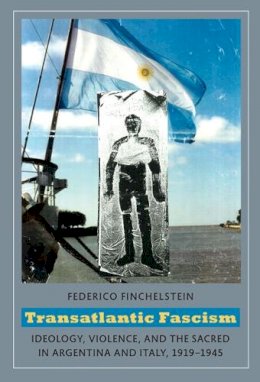Federico Finchelstein is Assistant Professor of History at the New School for Social Research and the Eugene Lang College of the New School in New York City.
“[T]hought-provoking, intelligent, well-researched, and complex work of intellectual history. . . . Finchelstein has written a book that is an important contribution to the study of fascism in general and makes an even more crucial contribution to the study of the ideology of the far Right in Argentina.” - Joel Horowitz, American Historical Review “Federico Finchelstein’s extensive background in fascist and Holocaust studies and his work in Italian and French archives set this book apart. So, too, does his approach. Rather than simply discuss European influence on Nacionalismo, Finchelstein analyzes ideas and perceptions flowing in both directions across the Atlantic. . . . A short review such as this one cannot do justice to the originality, richness, and subtlety of this book. Even the detailed endnotes, which practically constitute another volume, merit close examination. Finchelstein’s fine work surely will stimulate debates about fascist transnationalism, Nacionalismo, and this movement’s legacy for years to come.” - Sandra McGee Deutsch, Hispanic American Historical Review “[I]t is obvious that this book is a splendid contribution. But it is also welcome, necessary, and timely as extreme right-wing politics, authoritarianism, and party-led totalitarian states in the world are reasserting themselves. . . . If Churchill or Roosevelt had allowed a partial peace to end World War II, instead of total surrender, the Argentine politics described in this book would have joined Brazilian integralism to further autonomous fascist traditions in Central America, the Southern Cone, and the Andes. Finchelstein’s wonderful work paints a haunting image.” - Friedrich E. Schuler, The Americas “Federico Finchelstein’s careful and ambitiously researched book which rests on archival work done in Rome, Buenos Aires, and the United States usefully reframes the literature on fascism by successfully challenging its overwhelming Eurocentrism....[It] is an invaluable contribution to reinvigorating scholarly discussion of fascism and is sure to be emulated, contested, and extended in years to come.” - Dylan Riley, Journal of Modern History “Transatlantic Fascism is a fresh examination of fascism in Argentina from the perspective of its transnational connections. Federico Finchelstein provides new insight into fascism and its impact in Argentina.”—Donna Guy, author of Women Build the Welfare State: Performing Charity and Creating Rights in Argentina, 1880-1955 “Federico Finchelstein displays an exceptional combination of talents in Transatlantic Fascism: imagination tempered by diligence and meticulousness, independence tempered by judiciousness. His theoretical clarity and deep empirical research have forged a rich, intellectually rewarding, and important study of fascism. The book’s transnational perspective sheds much-needed light on a conceptually elusive ideology and political phenomenon.”—Jose C. Moya, author of Cousins and Strangers: Spanish Immigrants in Buenos Aires, 1850-1930 “In this innovative, impressively researched work, Federico Finchelstein takes an ambitious comparative approach to the historical study of fascism. He shows both how fascism was a transnational ideology and how that ideology was inflected and joined with at times violent practices according to different national traditions. His close inquiry into the Italian-Argentine connection sheds new light on a complex set of problems, including dimensions of fascism related to religion and to the manner in which fascism was understood and experienced by its committed activists. This book is important not only for specialists in European and Latin American history but for all historians and social scientists interested in problems of comparative history and methodology.”—Dominick LaCapra, Professor of History and Bowmar Professor of Humanistic Studies, Cornell University “In this original and refreshing work on the history of fascism between Europe and Latin America, Federico Finchelstein elaborates a new concept—transatlantic fascism—that predictably will raise a large debate among historians. Written from the perspective of global history, this book rethinks the history of fascism in its international, not only European, dimension.”—Enzo Traverso, author of The Origins of Nazi Violence “[I]t is obvious that this book is a splendid contribution. But it is also welcome, necessary, and timely as extreme right-wing politics, authoritarianism, and party-led totalitarian states in the world are reasserting themselves. . . . If Churchill or Roosevelt had allowed a partial peace to end World War II, instead of total surrender, the Argentine politics described in this book would have joined Brazilian integralism to further autonomous fascist traditions in Central America, the Southern Cone, and the Andes. Finchelstein’s wonderful work paints a haunting image.”
Friedrich E. Schuler
The Americas
“[T]hought-provoking, intelligent, well-researched, and complex work of intellectual history. . . . Finchelstein has written a book that is an important contribution to the study of fascism in general and makes an even more crucial contribution to the study of the ideology of the far Right in Argentina.”
Joel Horowitz
American Historical Review
“Federico Finchelstein’s careful and ambitiously researched book which rests on archival work done in Rome, Buenos Aires, and the United States usefully reframes the literature on fascism by successfully challenging its overwhelming Eurocentrism....[It] is an invaluable contribution to reinvigorating scholarly discussion of fascism and is sure to be emulated, contested, and extended in years to come.”
Dylan Riley
Journal of Modern History
“Federico Finchelstein’s extensive background in fascist and Holocaust studies and his work in Italian and French archives set this book apart. So, too, does his approach. Rather than simply discuss European influence on Nacionalismo, Finchelstein analyzes ideas and perceptions flowing in both directions across the Atlantic. . . . A short review such as this one cannot do justice to the originality, richness, and subtlety of this book. Even the detailed endnotes, which practically constitute another volume, merit close examination. Finchelstein’s fine work surely will stimulate debates about fascist transnationalism, Nacionalismo, and this movement’s legacy for years to come.”
Sandra McGee Deutsch
Hispanic American Historical Review

